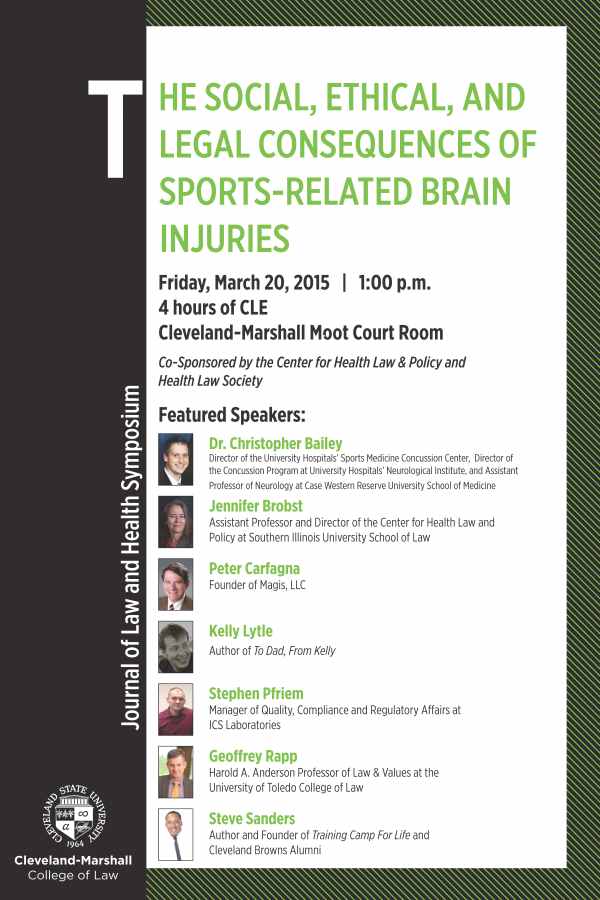The Quasi-Regulatory Environment of Athletic Equipment: Explaining Consensus Standards and Demonstrating How the Conformity Assessment Process for Protective Headgear Improves Safety
Location
Cleveland-Marshall College of Law
Start Date
20-3-2015 2:15 PM
End Date
20-3-2015 2:30 PM
Description
This presentation will begin with an explanation of what standards are and how standards development organizations create, promulgate and cyclically revise product standards as they relate to athletic protective equipment. I will give examples of different standards organizations and then provide a more focused discussion of those that are responsible for the most authoritative standards for protective headgear: voluntary consensus standard development organization ASTM, ad-hoc standard development organization NOCSAE, and most recently, the de facto standard-from-test-methodology Virginia Tech Helmet Ratings. “Conformity assessment”, “certification” and “accreditation” will be defined as concepts. I will discuss which interests and disciplines typically participate in the development of standards and what steps comprise the creation and maintenance of these documents that essentially provide “market-based governance” of athletic equipment.
The presentation will give a summary of both assessment (testing) and certification schemes that apply to some of the most common pieces of sports equipment in the United States at various levels of play. The organizations and relationships involved in translating this paradigm into a reality of increased player safety will be identified. Differences exist between the entities that occupy the key roles in the predominant conformity assessment system for each sport; these will be highlighted. The entire process seeks to serve end users while balancing the input of widely varying influences: a highly challenging task in light of liability concerns, the available epidemiological data and the pace of technology.
Finally, I will offer a simplified walkthrough of the testing processes for a few pieces of athletic equipment that ICS Labs tests per their applicable standard performance specifications and test methods, with a focus on helmets. I plan to highlight the function of key pieces of test equipment. Video and photographic examples of said testing will be exhibited. By citing past testing technology and highlighting developments on the horizon, I hope to convey the chronology of how the standards, product designs and testing technology have collectively evolved over time. The presentation will conclude with remarks about how the proper standards-based assessment and certification paradigm for sports helmets has the capability to promote safer gameplay and ultimately reduce the risk of concussion by incorporating the expertise and feedback of multiple stakeholders in a quasi-regulatory system that can be optimally responsive and accountable.
Stephen Pfriem, Bio, Title, Description
The Quasi-Regulatory Environment of Athletic Equipment: Explaining Consensus Standards and Demonstrating How the Conformity Assessment Process for Protective Headgear Improves Safety
Cleveland-Marshall College of Law
This presentation will begin with an explanation of what standards are and how standards development organizations create, promulgate and cyclically revise product standards as they relate to athletic protective equipment. I will give examples of different standards organizations and then provide a more focused discussion of those that are responsible for the most authoritative standards for protective headgear: voluntary consensus standard development organization ASTM, ad-hoc standard development organization NOCSAE, and most recently, the de facto standard-from-test-methodology Virginia Tech Helmet Ratings. “Conformity assessment”, “certification” and “accreditation” will be defined as concepts. I will discuss which interests and disciplines typically participate in the development of standards and what steps comprise the creation and maintenance of these documents that essentially provide “market-based governance” of athletic equipment.
The presentation will give a summary of both assessment (testing) and certification schemes that apply to some of the most common pieces of sports equipment in the United States at various levels of play. The organizations and relationships involved in translating this paradigm into a reality of increased player safety will be identified. Differences exist between the entities that occupy the key roles in the predominant conformity assessment system for each sport; these will be highlighted. The entire process seeks to serve end users while balancing the input of widely varying influences: a highly challenging task in light of liability concerns, the available epidemiological data and the pace of technology.
Finally, I will offer a simplified walkthrough of the testing processes for a few pieces of athletic equipment that ICS Labs tests per their applicable standard performance specifications and test methods, with a focus on helmets. I plan to highlight the function of key pieces of test equipment. Video and photographic examples of said testing will be exhibited. By citing past testing technology and highlighting developments on the horizon, I hope to convey the chronology of how the standards, product designs and testing technology have collectively evolved over time. The presentation will conclude with remarks about how the proper standards-based assessment and certification paradigm for sports helmets has the capability to promote safer gameplay and ultimately reduce the risk of concussion by incorporating the expertise and feedback of multiple stakeholders in a quasi-regulatory system that can be optimally responsive and accountable.


Speaker Information
Stephen Pfriem is the Manager of Quality, Compliance and Regulatory Affairs at ICS Laboratories. Located in Brunswick, Ohio, ICS Labs is an accredited conformity assessment body that tests personal protective equipment to domestic and international safety standards, performance specifications and other test methods. Stephen participates in the development of consensus standards for athletic equipment and adds a legal perspective to ICS Labs’ technical expertise when consulting with clients on document interpretation, R&D strategies, design and marketing, labeling and user instruction drafting, QA&QC, and other regulatory issues. He is an active member of ASTM, CSA and ISO committees that work to create & improve standards for hockey equipment. He also closely monitors developments related to football and lacrosse helmet safety. Mr. Pfriem received his J.D. from Cleveland-Marshall College of Law and is licensed to practice in Ohio.